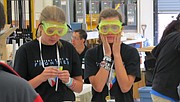Team takes third in state competition
MOSES LAKE — The Science Olympiad team from Frontier Middle School took 41st place at national competition, out of 60 teams. That was, said coach Jay Loutherback, a good finish in a “very demanding competition.”
Frontier’s team took first in regional competition. “The state level is a big step,” Loutherback said, but the Frontier team finished third. The two teams in front of them were from the same school, and only one team per school can advance. So the Frontier team made the trip to nationals.
If state competition is challenging – and it is – national competition is even more challenging. “They tighten the tolerances. At each level the demands of the event get tougher,” Loutherback said.
Science Olympiad features 23 events, and the team must sign up for all 23. “Kind of like a track meet in a way.” Students pick their events, just like track. The choices range from biology to physics to paleontology to forensic science. Not everybody gets their first choice in events, he said. But usually kids get interested in the subject, even if it wasn’t their preferred choice. “They wind up loving some of these events.”
Competitors had to build a bridge, but not just any bridge. “The lightest bridge that can hold the greatest mass,” he said. The bottle rocket competition required a rocket that could carry an egg and return the egg safely to earth.
Science Olympiad competitors investigated a make-believe crime scene, and they tracked (and figured out how to arrest) the spread of a make-believe disease. In food science competition “the kids had to make cheese, ice cream and butter,” Loutherback said. Part of that competition required explaining how to avoid contamination.
The kids evaluated fossils and worked on questions about deep space. They had to come up with a plan to fight invasive species in ecology competition. Then there was “mission possible” competition, where kids had to come up with a device to complete a task. “That’s always a challenge,” Loutherback said. “Everything has to be just right. Like Goldilocks.”
There was plenty more – meteorology, aviation (teams had to build and fly a glider), geology. Kids had to devise and conduct an experiment and prepare a written report of their results. They had to write directions for a scientific task.
The goal is to encourage a love for science, and for many kids Science Olympiad does that, he said. Frontier’s 2002 Science Olympiad team produced three physicians, a veterinarian and a U.S. Air Force pilot, among others. “The kids – they go on. Remarkable young people.”
The Science Olympiad team has an impact after the competition is over. “The kids develop a new type of work ethic and commitment to something.”
The Science Olympiad team has three coaches in addition to Loutherback: his wife Bonni, Steve Gjefle and Tim Miller.
Cheryl Schweizer can be reached via email at education@columbiabasinherald.com.





